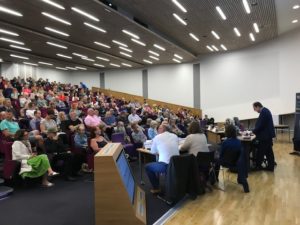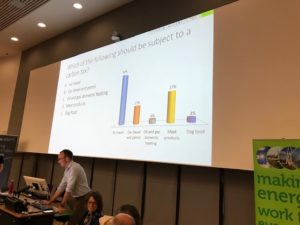On 23rd of April the Global Systems Institute hosted a talk titled ‘So you’ve declared a climate emergency – what now?’. It was a thought provoking title, considering the string of institutions, cities and countries that have recently declared a climate emergency without specifying what action will be taken to reduce or eliminate their dependency on carbon. Therefore deciding exactly what should follow such declarations is the crucial next step.
The discussion was led by a diverse panel made up of individuals of different ages, backgrounds, and representing different sectors. It presented a wide range of perspectives on the implications of the climate emergency and the most viable ways to curb human caused climate change. The panel included young activist and Student Climate Network representative Sam Sleeman, Exeter councillor Diana Moore, representatives of local environmental groups, and a range of experts of different fields from the University of Exeter. The audience was also encouraged to participate by posing questions to the panel and taking part in a poll on the most pressing issues relating to the climate emergency, so the local community was also given a substantial voice throughout the event. The result was a range of thought provoking suggestions on the social, political, and fiscal initiatives that could be used to tackle our carbon dependence, and interesting considerations of the strengths as well as the shortcomings of the different initiatives.

Surprisingly, few of the ideas posed by the panellists focused on the changes that could be made by individuals, and instead the focus was on citizens organising into groups to effect change through political means. Dr Alice Moseley proposed that citizens’ assemblies on climate change should be established, acknowledging that it would take time for them to take effect, but still stressing their importance for long term environmental policy making. Sam Sleeman also proposed youth assemblies to give the younger generation a stronger voice when it comes to environmental policies that are being implemented. Addressing a room of some four hundred people in Exeter and more people watching the livestream in Penryn, who all chose to spend their evening at the event, the idea of citizens’ assemblies on climate change certainly held much promise, and was backed by the audience poll which showed that the vast majority in the room supported their formation. Throughout the event, the importance of allowing local governments more power to make environmentally friendly decisions was also stressed, with particular focus on its very local application; how this could influence the building of better insulated homes in Exeter. There was clear expectation that governments should do more, locally as well as nationally, to act on the climate emergency, with the help and pressure from their citizens.
In practical terms, there were several key areas that the panel focused on as crucial to reducing our carbon dependency. As a graph presented by Professor Pierre Friedlingstein showed early on in the event, in the recent decades the transport and housing sectors saw only a small decrease in their carbon emission, and should now be the focus for the most profound change. This was reiterated in many forms throughout the event, with the suggestion that flying should be more heavily taxed, and 53% of the audience choosing aviation as the main industry that carbon tax should be placed on, with road travel coming in third place in the same poll. The importance of well insulated homes that would rely less on heating was also mentioned several times, as was the importance of building them in accessible locations that did not require long commutes to workplaces and shops. While the ideas suggested by the panellists came from different perspectives, there seemed to be general agreement on the key areas of improvement, both from the theoretical perspective of science-backed academics, and from those representing the community and concerned with the practicalities of dealing with the climate emergency.

Strikingly, many of the suggested responses to the climate emergency were not in any way novel; the importance of reducing the carbon emission associated with transport and housing, or the importance of moving away from our fast paced and extremely carbon dependent consumerist culture, are often stated as crucial areas that need rapid alterations if we are to avert an irreversible climate disaster. The event highlighted the problems associated with effecting change in these areas, including the concentration of power with the central government, the outsourcing of environmentally harmful initiatives to the private sector, and the lobbying power of corporations. Another crucial issue that both the audience and the panel emphasised is the difficulty of fundamentally altering our consumerist culture. The continued stress on the same issues points to the fact that despite the difficulties, these areas cannot be ignored if our society is to become carbon neutral in the next few decades, as is now necessary. The declarations of climate emergency are an encouraging sign that we are moving in the right direction, provided that the necessary action follows.
The event highlighted that while responding to the climate emergency will be a complex process that will require the cooperation of central and local governments and businesses, the people also have an important part to play, by ensuring that reducing carbon emission is kept at the forefront of the agenda. Experts are clear on what changes need to be made; implementing these changes at home and globally is the key challenge, especially considering the host of countries that continue to question the science behind climate change. Individual actions are no longer sufficient, and better organisation is necessary to ensure that councils, governments, and institutions are taking the action they pledged to take. In the long term, civic bodies that advise governments on environmental policies would be highly desirable, but before these become established, the importance of education on worldwide climate change awareness campaigns, support for environmental movements, and protests and petitions against heavily carbon dependent practices cannot be overstated. For this reason, it was great to see so much dialogue between the university, environmental groups and organisations, and the general public, and hopefully similar cooperation will be utilised in the near future.
Malwina Grzesikiewicz, University of Exeter student
